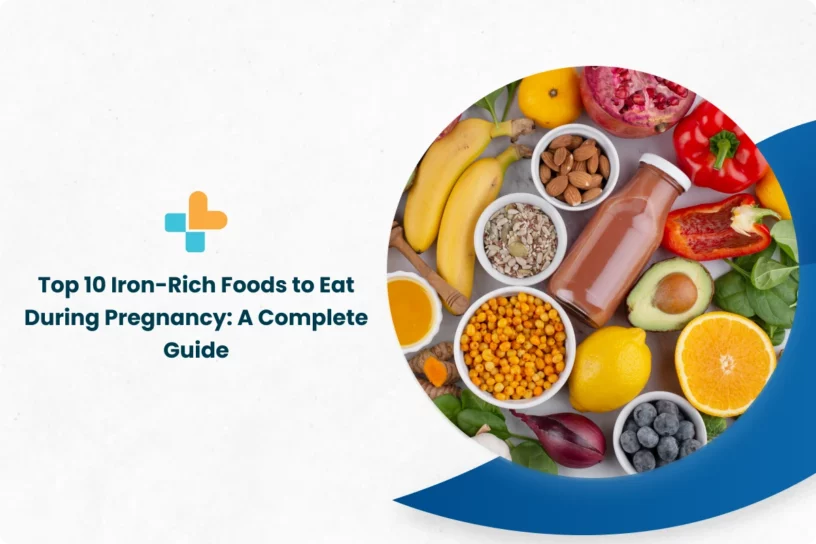Pregnancy is a time when a woman’s body goes through numerous changes, and it requires extra care and attention. One of the most important things that an expectant mother needs to keep in mind is her diet, especially when it comes to getting enough iron. Iron is an essential nutrient that is needed to make hemoglobin, a protein in red blood cells that carries oxygen to all parts of the body. During pregnancy, the demand for iron increases significantly, and not getting enough of it can lead to anemia, preterm delivery, and low birth weight.
In this blog post, we will provide you with a comprehensive guide on the top 10 iron-rich foods that you can eat during pregnancy to ensure that you and your baby are healthy and thriving.
Why You Need Iron
Iron is essential during pregnancy for the production of red blood cells, the placenta, and the baby’s brain development, and to ensure the mother’s energy levels. Iron deficiency can lead to anemia and increase the risk of complications for both mother and baby. Therefore, it is important for pregnant women to consume enough iron through their diet or supplements.
Iron Basics
Iron is also important for the proper functioning of the immune system, cognitive development, and energy metabolism. During pregnancy, the demand for iron increases significantly to support the growth and development of the baby. The World Health Organization recommends a daily intake of 27 mg of iron for pregnant women to ensure optimal health for both the mother and baby.
However, iron deficiency is one of the most common nutritional deficiencies in the world, and pregnant women are particularly susceptible to it. Therefore, it is essential for pregnant women to consume enough iron through their diet or supplements to prevent iron deficiency and its associated complications.
Iron-Rich Foods
Here are 10 iron-rich foods and their iron content per serving:
- Spinach: Spinach is a leafy green vegetable that is rich in iron, along with other nutrients like vitamins A and C, and folate.
- Lentils: Lentils are a type of legume that are high in iron, protein, and fiber. They are a staple food in Indian cuisine and come in a variety of colors and sizes.
- Tofu: Tofu, also known as bean curd, is a vegetarian source of iron that is made from soybeans. It is also a good source of protein and calcium.
- Chickpeas: Chickpeas, also called garbanzo beans, are a type of legume that are rich in iron, protein, and fiber. They are commonly used in Indian dishes like chana masala.
- Red Meat: Red meat such as lamb and beef are high in heme iron, which is easily absorbed by the body. However, it is recommended to consume red meat in moderation due to its high-fat content.
- Poultry: Chicken and turkey are also good sources of heme iron. They are also leaner sources of protein compared to red meat.
- Fish: Fish such as salmon, tuna, and sardines are high in heme iron as well as omega-3 fatty acids which have numerous health benefits.
- Sesame Seeds: Sesame seeds are a good source of iron and are commonly used in Indian cuisine in dishes like chikki, laddu, and tahini.
- Amaranth: Amaranth is a gluten-free grain that is high in iron, protein, and fiber. It is commonly used in Indian dishes like porridge or as a flour substitute in baked goods.
- Jaggery: Jaggery is a traditional Indian sweetener made from sugarcane or palm sap. It is a good source of iron and other minerals like calcium and magnesium. Jaggery is often used in desserts or added to tea for sweetness.
It is important to note that the iron content of these foods can vary depending on factors like cooking methods and processing. It is also important to consume iron-rich foods in combination with vitamin C-rich foods like citrus fruits, tomatoes, or bell peppers to enhance iron absorption.
Tips
Here are some tips for adding iron-rich foods to your diet during pregnancy:
- Eat a variety of iron-rich foods: Include a variety of iron-rich foods in your diet such as spinach, beans, lentils, red meat, poultry, fish, fortified cereals, and nuts.
- Pair iron-rich foods with vitamin C: Vitamin C helps your body absorb iron more efficiently. You can pair iron-rich foods with vitamin C-rich foods such as oranges, strawberries, tomatoes, or bell peppers.
- Cook in cast iron pots and pans: Cooking in cast iron pots and pans can increase the iron content of your food.
- Snack on iron-rich foods: Snack on iron-rich foods such as dried fruits, nuts, and seeds.
- Choose fortified foods: Choose foods that are fortified with iron, such as cereals, bread, and pasta.
- Avoid drinking tea or coffee with meals: Drinking tea or coffee with meals can reduce the absorption of iron from your food.
- Consider taking supplements: If you are not able to get enough iron from your diet, your healthcare provider may recommend iron supplements. However, it is important to speak to your healthcare provider before taking any supplements during pregnancy.
Vegetarians
For vegetarians, it can be challenging to get enough iron in their diet as most plant-based sources of iron are less easily absorbed by the body than animal-based sources. However, there are still plenty of options for vegetarians to get enough iron. Plant-based sources of iron include spinach, beans, lentils, fortified cereals, tofu, and nuts. Vegetarians can also pair these iron-rich foods with vitamin C-rich foods, such as citrus fruits or bell peppers, to increase the absorption of iron. Consider consulting with a registered dietitian who specializes in vegetarian diets to ensure that you are getting enough iron and other essential nutrients during pregnancy.
Meat
Meat is a rich source of iron that is easily absorbed by the body. Beef, pork, and lamb are all excellent sources of iron, as well as high-quality protein and other essential nutrients. Pregnant women who eat meat should choose lean cuts and avoid processed meats, such as bacon or sausage. It is also important to cook meat thoroughly to reduce the risk of foodborne illness. Pregnant women should aim to eat a variety of iron-rich foods, including meat, to ensure that they are getting enough iron in their diet. However, if you are a vegetarian or have dietary restrictions that prevent you from eating meat, there are still plenty of options to get enough iron in your diet.
Absorption
Iron absorption can be influenced by various factors, such as the type of iron (heme or non-heme), the presence of other dietary components (such as vitamin C, which enhances absorption), and individual factors like age, gender, and overall health. Heme iron, which is found in animal-based foods such as red meat and poultry, is generally more readily absorbed than non-heme iron, which is found in plant-based foods such as beans, lentils, and leafy greens. To maximize iron absorption, it is recommended to consume iron-rich foods along with foods that contain vitamin C. Other important nutrients to consider for pregnancy include folate, calcium, and vitamin D.
Supplements
Here are some supplements that may be beneficial for pregnant women who want to ensure they are getting enough iron:
- Prenatal vitamins
- Iron supplements
- Folate supplements
- Vitamin C supplements
- Vitamin B12 supplements
Remember, supplements should be taken under the guidance of a healthcare provider, as taking too much of certain nutrients can be harmful to both the mother and baby.
Also Read : Papaya During Pregnancy: Benefits, Risks, and Precautions
Conclusion
In conclusion, maintaining a healthy and balanced diet is crucial during pregnancy to ensure the health of both the mother and the baby. Consuming iron-rich foods is particularly important, as iron plays a vital role in the production of red blood cells and in the development of the baby’s brain.
Ayu Health, as a healthcare service provider, understands the importance of proper nutrition during pregnancy and offers support and guidance to ensure that pregnant women are meeting their dietary needs.
Our Hospital Locations
Gynaecology Surgery Hospitals in Chandigarh | Gynaecology Surgery Hospitals in Bangalore | Gynaecology Surgery Hospitals in Jaipur | Gynaecology Surgery Hospitals in NCR | Gynaecology Surgery Hospitals in Hyderabad
Our Doctors
Gynaecology Surgery Doctors in Chandigarh | Gynaecology Surgery Doctors in Bangalore | Gynaecology Surgery Doctors in Jaipur | Gynaecology Surgery Doctors in NCR | Gynaecology Surgery Doctors in Hyderabad
About the Author





